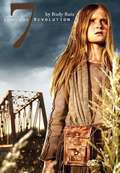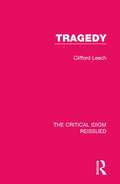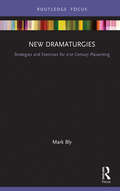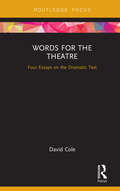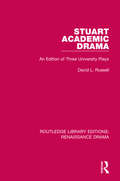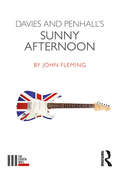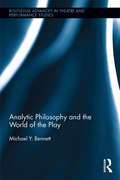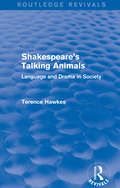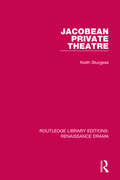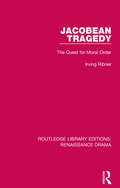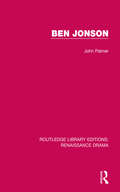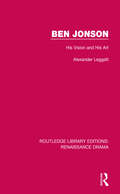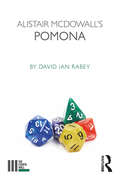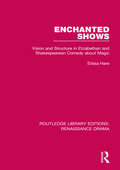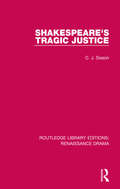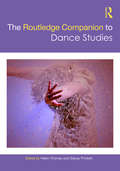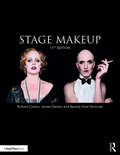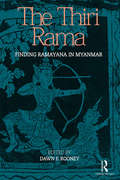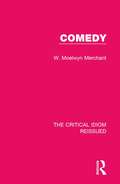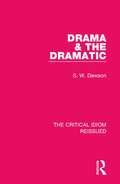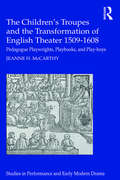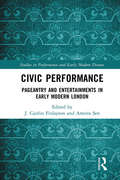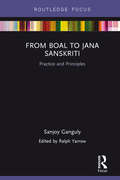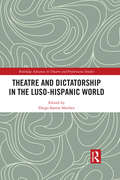- Table View
- List View
Seven for the Revolution
by Rudy RuizA young Latina struggles to communicate with her immigrant grandfather when her mother prohibits her from speaking Spanish. <P><P>A boy grapples with the slippery nature of laws, rules and ambition along the US-Mexico border in his quest for the American Dream. <P><P>An elderly woman's land, life and loyalties are divided by a controversial border fence. <P><P>A South American immigrant encounters racism and love in an LA elevator as turmoil swirls around a radical change in immigration policy. <P><P>In post-apocalyptic New York, a Latina fights to defend the last vestiges of a nation's pride as disgruntled creditors threaten to confiscate the Statue of Liberty.
The Essential Theatre
by Oscar G. Brockett Robert J. Ball John Fleming Andrew CarlsonThe Eighth Edition of THE ESSENTIAL THEATRE will help you get your students excited about theatre. The combined authorship of an authoritative theatre historian and his former student, an active theatre historian himself, make this the book perfect for your introductory theatre course. In the 35 years since it was first published, THE ESSENTIAL THEATRE has established a reputation as one of the most comprehensive, authoritative surveys of the theatre in academia. Now in a new full color format with many representations of current and classic performances, this text will encourage your students to become active theatergoers and fans. THE ESSENTIAL THEATRE works in tandem with its companion anthology, PLAYS FOR THEATRE. The scripts in PLAYS serve as a foundation for discussion of the various types of theatrical experience explored in the text.
Tragedy (The Critical Idiom Reissued #1)
by Clifford LeechFirst published in 1969, this work examines the genre of Tragedy from its origins in ancient Greece, to the modern day. Beginning with an overview of the meaning of tragedy in Europe through the ages, it goes on to explore common aspects of tragedies such as the tragic hero, the chorus and unities, catharsis, peripeteia, anagnorisis and suffering. This book will be of interest to anyone studying European drama and literature.
New Dramaturgies: Strategies and Exercises for 21st Century Playwriting (Focus on Dramaturgy)
by Mark BlyIn New Dramaturgies: Strategies and Exercises for 21st Century Playwriting, Mark Bly offers a new playwriting book with nine unique play-generating exercises. These exercises offer dramaturgical strategies and tools for confronting and overcoming obstacles that all playwrights face. Each of the chapters features lively commentary and participation from Bly’s former students. They are now acclaimed writers and producers for media such as House of Cards, Weeds, Friday Night Lights, Warrior, and The Affair, and their plays appear onstage in major venues such as the Roundabout Theatre, Yale Rep, and the Royal National Theatre. They share thoughts about their original response to an exercise and why it continues to have a major impact on their writing and mentoring today. Each chapter concludes with their original, inventive, and provocative scene generated in response to Bly’s exercise, providing a vivid real-life example of what the exercises can create. Suitable for both students of playwriting and screenwriting, as well as professionals in the field, New Dramaturgies gives readers a rare combination of practical provocation and creative discussion.
Words for the Theatre: Four Essays on the Dramatic Text (Focus on Dramaturgy)
by David ColeIn Words for the Theatre, playwright David Cole pursues a course of dramaturgical self-questioning on the part of a playwright, centred on the act of playwriting. The book’s four essays each offer a dramaturgical perspective on a different aspect of the playwright’s practice: How does the playwright juggle the transcriptive and prescriptive aspects of their activity? Does the ultimate performance of a playtext in fact represent something to which all writing aspires? Does the playwright’s process of withdrawing to create their text echo a similar process in the theatre more widely? Finally, how can the playwright counter theatre’s pervasive leaning towards the ‘mistake’ of realism? Suited to playwrights, teachers, and higher-level students, this volume of essays offers reflections on the questions that confront every playwright, from an author well-versed in supplying words for the theatre.
Stuart Academic Drama: An Edition of Three University Plays (Routledge Library Editions: Renaissance Drama)
by David L. RussellAlthough not much is known about the three Stuart plays in this edition, which was first published in 1987, we can ascribe them to one of the English universities, and each is indicative of a distinctly different influence on the Renaissance academic drama. Heteroclitanomalonomia is part of a minor subgenre referred to as the academic play. It demonstrates the predominance of language or rhetoric studies in the period and its very subject is of purely academic interest. Gigantomachia displays the continuing interest of the Renaissance in classical mythology. And A Christmas Messe follows a more homely tradition, a farcical personification of the mundane. This title will be of interest to students of English Literature, Drama and Performance.
Davies and Penhall's Sunny Afternoon
by John FlemingWhen ‘You Really Got Me’ exploded on Swinging London in 1964, the Kinks forever changed the course of rock ’n’ roll. Ray Davies and Joe Penhall’s Olivier Award-winning Sunny Afternoon (2014) covers the band’s formative years of 1964–7, when four working- class North London lads broke through to become one of the most unlikely and influential rock bands of the 1960s. Mixing the comic adventures of ‘Dave the Rave’ with the touching introspection of Ray’s sometimes fragile psyche, Joe Penhall’s script weaves Ray Davies’ songs, both the hits and lesser-known works, into one of the finest jukebox musicals of the new millennium. Drawing on a wealth of background material, John Fleming examines the blend of events and songs selected, reconsidering the relationship between biography and drama to shed new light on the Kinks and the musical that tells their story.
Analytic Philosophy and the World of the Play (Routledge Advances in Theatre & Performance Studies)
by Michael Y. BennettTheatrical characters’ dual existence on stage and in text presents a unique, challenging case for the analytical philosopher. Analytic Philosophy and the World of the Play re-examines the ontological status of theatre and its fictional objects through the "possible worlds" thesis, arguing that theatre is not a mirror of our world, but a re-creation of it. Taking a fresh look at theatre’s key elements, including the hotly contested relationships between character and actor; onstage and offstage "worlds"; and the play-text and performance, Michael Y. Bennett presents a radical new way of understanding the world of the play.
Routledge Revivals (1973): Language and Drama in Society
by Terence HawkesFirst published in 1973, this book is about Shakespeare, language and drama. The first part introduces some common ideas of anthropology and linguistics into an area where they serve as a base for the discussion of usually literary matters. It attempts to link language to our experience of speech — examining its range, texture, and social functions. In part two, the author argues that in Elizabethan culture there was a greater investment in the complexities and demands of speech due to the widespread illiteracy of the time. It examines eight of Shakespeare’s plays, together with one of Ben Jonson’s, in light of their concern with various aspects of the role of spoken language in society.
Jacobean Private Theatre (Routledge Library Editions: Renaissance Drama)
by Keith SturgessIn this scholarly and entertaining book, first published in 1987, the author tells the story of Jacobean private theatre. Most of the best plays written after 1610, including Shakespeare’s late plays such as The Tempest, were written for the new breed of private playhouses – small, roofed and designed for an aristocratic, literary audience, as opposed to the larger, open-air houses such as the Globe and the Red Bull, catering for a popular, ‘lowbrow’ audience. The author discusses the polarisation of taste and the effect it had on literary criticism and theatre history. This title will be of interest to students of English Literature, Drama and Performance.
Jacobean Tragedy: The Quest for Moral Order (Routledge Library Editions: Renaissance Drama)
by Irving RibnerThe work of dramatists such as George Chapman, Thomas Heywood, Cyril Tourneur, John Webster, Thomas Middleton and John Ford can profitably be studied as attempts to construct a new moral order in response to the absence or weakening of the religious sanction. In this study, first published in 1962, the author examines these texts in detail, and throws a great deal of light on the plays as plays. This title will be of interest to students of English Literature, Drama and Performance.
Ben Jonson (Routledge Library Editions: Renaissance Drama)
by John PalmerWhile most critical writing on Jonson concentrates on the plays, poems or masques seen in isolation, this title, first published in 1981, ranges across the genres to explore Jonson’s vision as a whole. The author points to the inner connections that make of the rich variety of Jonson’s writing a single coherent body of work. We see Jonson exploring the relations between culture and society, the difficulties of ideal virtue in a far from ideal world, and above all the problems of art itself. Combining a wide-ranging discussion of Jonson’s interests with a detailed examination of his major works, this book provides a balanced critical introduction to one of the most complex and fascinating figures in English Literature.
Ben Jonson: His Vision and His Art (Routledge Library Editions: Renaissance Drama)
by Alexander LeggattWhile most critical writing on Jonson concentrates on the plays, poems or masques seen in isolation, this title, first published in 1981, ranges across the genres to explore Jonson’s vision as a whole. The author points to the inner connections that make of the rich variety of Jonson’s writing a single coherent body of work. We see Jonson exploring the relations between culture and society, the difficulties of ideal virtue in a far from ideal world, and above all the problems of art itself. Combining a wide-ranging discussion of Jonson’s interests with a detailed examination of his major works, this book provides a balanced critical introduction to one of the most complex and fascinating figures in English Literature.
Alistair McDowall's Pomona (The Fourth Wall)
by David Ian Rabey‘It’s all real. All of it. Everything bad is real’ - Moe Alistair McDowall’s Pomona was first staged in 2014 and won properly startling, and startled, acclaim. Its edgeland setting permits a surrealistic disengagement of linear forms of time, which is both dreamlike and wildly funny; nightmarish and ominously enveloping. The play has as its imaginative springboard a landscape which is both real and surreal. It offers an unforgettable journey into radical uncertainty, alongside unpredictable action that presents and questions the forms by which all too much of British life is lived. Rabey offers us a wild plunge into this modern English urban rabbit hole, a haunting and bewildering high-stakes hunt for meaning and value, set in a gothic noir Manchester, possibly dystopian (or possibly not).
Enchanted Shows: Vision and Structure in Elizabethan and Shakespearean Comedy about Magic (Routledge Library Editions: Renaissance Drama)
by Elissa HareThe book, first published in 1988, examines the role of magic in Elizabethan and Shakespearean theatre. The author observes how certain plays, including Shakespeare’s A Midsummer Night’s Dream and The Tempest, rationalise the unrealism and improbabilities typical of romantic comedy as miracles wrought by specifically magical intervention. The author also explores the ways in which playwrights justify structural discontinuity by the working of magic. This title will be of interest to students of English Literature, Drama and Performance.
Shakespeare's Tragic Justice (Routledge Library Editions: Renaissance Drama)
by C. J. SissonThe problem of justice seems to have haunted Shakespeare as it haunted Renaissance Christendom. In this book, first published in 1963, four aspects of the problems of justice in action in Shakespeare’s great tragedies are explored. This study is based on the lifetime’s research of Elizabethan habits of mind by one of the most distinguished Shakespearean scholars, and will be of interest to students of English Literature, Drama and Performance.
The Routledge Companion to Dance Studies (Routledge Companions)
by Helen Thomas Stacey PrickettThe Routledge Companion to Dance Studies maps out the key features of dance studies as the field stands today, while pointing to potential future developments. It locates these features both historically—within dance in particular social and cultural contexts—and in relation to other academic influences that have impinged on dance studies as a discipline. The editors use a thematically based approach that emphasizes that dance scholarship does not stand alone as a single entity, but is inevitably linked to other related fields, debates, and concerns. Authors from across continents have contributed chapters based on theoretical, methodological, ethnographic, and practice-based case studies, bringing together a wealth of expertise and insight to offer a study that is in-depth and wide-ranging. Ideal for scholars and upper-level students of dance and performance studies, The Routledge Companion to Dance Studies challenges the reader to expand their knowledge of this vibrant, exciting interdisciplinary field.
Stage Makeup: Special Edition
by Richard Corson James Glavan Beverly Gore NorcrossWidely referred to as the "bible of stage makeup," the timely revision of this classic text addresses principles and techniques in the use of makeup for the contemporary performer. This extensive exploration of the application and use of stage makeup and makeup for a variety of performance venues covers all aspects in detail and contains over 1000 photographs, drawings, and diagrams demonstrating step-by-step procedures. Thoroughly updated and revised, this classic text remains accurate and comprehensive, providing information from which all readers – whether students new to the field or seasoned, professional makeup artists – will benefit. New to this edition: Updated full-color photography throughout Expanded information on makeup design and application 48 new step-by-step instructions in color Expanded chapter on modeling with highlights and shadows New chapter on cross-gender makeup New instruction on making dentures, noses, and face casting New instructions for creating zombies, animals, aging effects, and trauma Expanded information on makeup for television and film Up-to-date information on Special Effects makeup Up-to-date information on prosthetic makeup Updated chapters on facial hair and wigs Updated resources for products, advanced training, and health and safety
The Thiri Rama: Finding Ramayana in Myanmar
by Dawn RooneyThe Thiri Rama – or the Great Rama – was written for court performance and is the only known illustrated version of the Ramayana story in Myanmar. Based on palm-leaf manuscripts and scenes carved on over 300 sandstone plaques at a mid-nineteenth-century Buddhist pagoda west of Mandalay in Myanmar, this book presents an original translation of the Thiri Rama rendered in prose. The volume also includes essays on the history and tradition of the Ramayana in Myanmar as well as the cultural context in which the play was performed. It contains many helpful resources, incorporating a glossary and a list of characters and their corresponding personae in Valmiki’s Ramayana. With over 250 fascinating visuals and core text contributions by distinguished Burmese scholars, U Thaw Kaung, Tin Maung Kyi, and U Aung Thwin, this book will greatly interest scholars and researchers of South and Southeast Asian culture, literary forms, epics, art and art history, theatre and performance studies, religion, especially those concerned with Hinduism, as well as folklorists.
Comedy (The Critical Idiom Reissued #20)
by Moelwyn MerchantFirst published in 1972, this work pursues the question ‘what is comedy?’ In its quest for an answer it explores critical theory, psychology, sociology and metaphysics. It also examines the classical origins of comedy, different kinds of comedy, the rituals of comedy, its relationship with other idioms such as ‘satire’, irony’ and ‘farce’, and compares two major traditions: ‘Aristophanic’ and ‘Shakesperean’ comedy. In doing so, the book demonstrates the indefinable and flexible nature of comedy. This work will be a valuable resource to those studying drama, and in particular, those focusing on classical and Shakespearean plays.
Drama & the Dramatic (The Critical Idiom Reissued #10)
by S. W. DawsonFirst published in 1970, this book explores drama as literature and provides critical overviews of different aspects of drama and the dramatic. It first asks what a play is, before going on to examine dramatic language, action and tension, dramatic irony, characters and drama’s relationship with modern criticism and the novel. This book will be a valuable resource to those studying drama and English literature.
The Children's Troupes and the Transformation of English Theater 1509-1608: Pedagogue, Playwrights, Playbooks, and Play-boys (Studies in Performance and Early Modern Drama)
by Jeanne McCarthyThe Children’s Troupes and the Transformation of English Theater 1509–1608 uncovers the role of the children’s companies in transforming perceptions of authorship and publishing, performance, playing spaces, patronage, actor training, and gender politics in the sixteenth century. Jeanne McCarthy challenges entrenched narratives about popular playing in an era of revolutionary changes, revealing the importance of the children’s company tradition’s connection with many early plays, as well as to the spread of literacy, classicism, and literate ideals of drama, plot, textual fidelity, characterization, and acting in a still largely oral popular culture. By addressing developments from the hyper-literate school tradition, and integrating discussion of the children’s troupes into the critical conversation around popular playing practices, McCarthy offers a nuanced account of the play-centered, literary performance tradition that came to define professional theater in this period. Highlighting the significant role of the children’s company tradition in sixteenth-century performance culture, this volume offers a bold new narrative of the emergence of the London theater.
Civic Performance: Pageantry and Entertainments in Early Modern London (Studies in Performance and Early Modern Drama)
by J. Caitlin Finlayson Amrita SenCivic Performance: Pageantry and Entertainments in Early Modern London brings together a group of essays from across multiple fields of study that examine the socio-cultural, political, economic, and aesthetic dimensions of pageantry in sixteenth and seventeenth-century London. This collection engages with modern interest in the spectacle and historical performances of pageantry and entertainments, including royal entries, progresses, coronation ceremonies, Lord Mayor’s Shows, and processions. Through a discussion of the extant texts, visual records, archival material, and emerging projects in the digital humanities, the chapters elucidate the forms in which the period itself recorded its public rituals, pageantry, and ephemeral entertainments. The diversity of approaches contained in these chapters reflects the collaborative nature of pageantry and civic entertainments, as well as the broad socio-cultural resonances of this form of drama, and in doing so offers a study that is multi-faceted and wide-ranging, much like civic performance itself. Ideal for scholars of Early Modern global politics, economics, and culture; literary and performance studies; print culture; and the digital humanities, Civic Performance casts a new lens on street pageantry and entertainments in the historically and culturally significant locus of Early Modern London.
From Boal to Jana Sanskriti: Practice and Principles
by Sanjoy GangulyJana Sanskriti is internationally recognised as the most iconic post-Boalian Theatre of the Oppressed operation in the world today. This fully illustrated book by the Bengali company's founder and artistic director Sanjoy Ganguly, edited by Ralph Yarrow, collects and explains their programme of workshop exercises, placing them in the context of their social and activist work. A set of interviews with Ganguly complements these practical sequences, drawing in topics such as the role of the joker, the nature of development, participation and agency, aesthetics as transformation, and Theatre of the Oppressed in the context of a market economy.
Theatre and Dictatorship in the Luso-Hispanic World (Routledge Advances in Theatre & Performance Studies)
by Diego SánchezTheatre and Dictatorship in the Luso-Hispanic World explores the discourses that have linked theatrical performance and prevailing dictatorial regimes across Spain, Portugal and their former colonies. These are divided into three different approaches to theatre itself - as cultural practice, as performance, and as textual artifact - addressing topics including obedience, resistance, authoritarian policies, theatre business, exile, violence, memory, trauma, nationalism, and postcolonialism. This book draws together a diverse range of methodological approaches to foreground the effects and constraints of dictatorship on theatrical expression and how theatre responds to these impositions.
